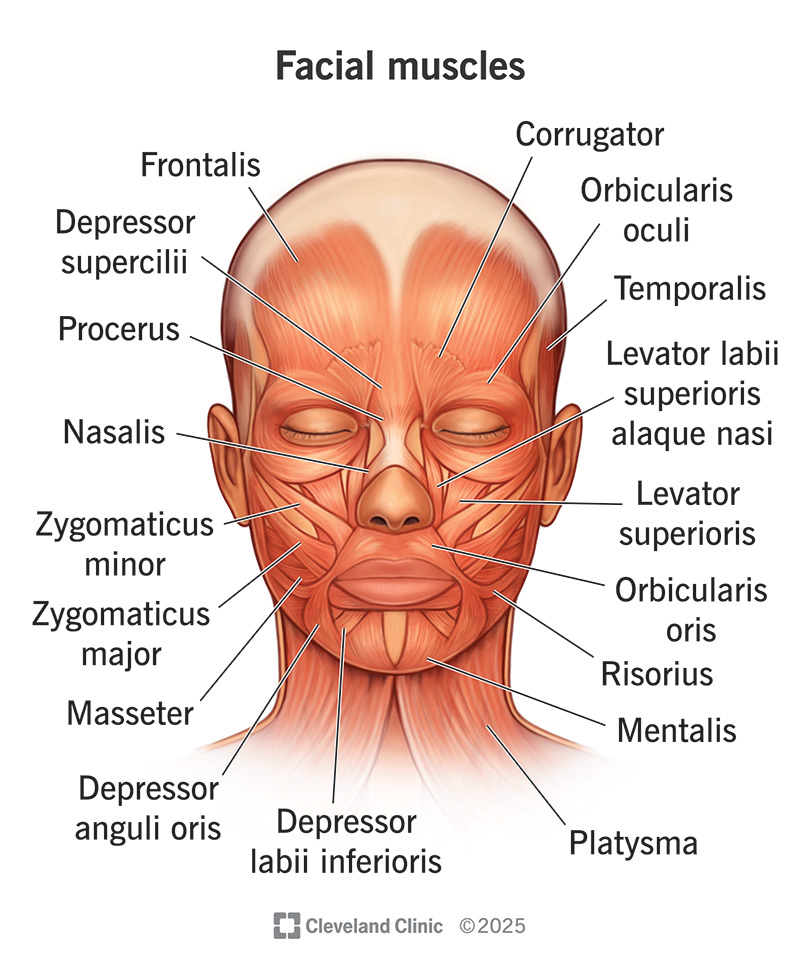You have many different facial muscles. They all work together to control the parts of your face. You can find them anywhere behind the skin of your face — from your scalp above your forehead down to the skin on your neck. You need face muscles to chew, make facial expressions and perform other tasks.
Advertisement
Cleveland Clinic is a non-profit academic medical center. Advertising on our site helps support our mission. We do not endorse non-Cleveland Clinic products or services. Policy

Image content: This image is available to view online.
View image online (https://my.clevelandclinic.org/-/scassets/Images/org/health/articles/facial-muscles)
Your face has about 20 flat skeletal muscles that attach to different places on your skull. These are your facial muscles (also called craniofacial muscles), and they’re essential to chewing and making facial expressions. They originate from bone or fascia and insert into your skin. Facial muscles work together to control movements in your:
Advertisement
Cleveland Clinic is a non-profit academic medical center. Advertising on our site helps support our mission. We do not endorse non-Cleveland Clinic products or services. Policy
Your facial muscles are responsible for two major tasks: chewing (also called masticating) and making facial expressions. These include smiling, pouting or raising your eyebrows in surprise.
Other functions of the muscles of your face include:
Facial muscles are located throughout your face, including your ears, mouth, forehead, nose and eyes. They run underneath your skin from your scalp down to your neck. They’re positioned around facial openings and stretch across your skull and neck.
You have many muscles in your face. These muscles are typically paired, meaning you have one on the left side of your face and one on the right side.
The facial muscles involved in chewing (muscles of mastication) are:
Advertisement
The muscles that control facial expression can be further divided into groups based on where they’re located on your face.
Your auricular muscles are around your ears. They allow some people to move their ears. They are:
Your buccolabial muscles are in and around your mouth. They are:
Your epicranial muscles are around your forehead, skull and neck. They are:
Your nasal muscles are around your nose. They are:
Your orbital muscles surround your eyes. They are:
Your face muscles are part of your skeletal system (musculoskeletal system). All the muscles in this system contain elastic fibers that allow them to contract. Some of the fibers look dark and some look light, so they appear striped (striated) red and white when viewed under a microscope.
To function, your facial muscles get signals from your brain via your facial nerve. But sometimes, they can’t receive those signals properly.
Damage to your facial nerve and problems with your facial muscles can result from:
Smile — you just used numerous muscles in your face. Your facial muscles work together to control the parts of your face. While you might not think about them much, they’re essential for chewing, making facial expressions and doing many other things. You can’t eat, smile or even talk without them. So, next time you chomp down on your favorite food or laugh at a joke, remember you have your face muscles to thank.
Advertisement

Sign up for our Health Essentials emails for expert guidance on nutrition, fitness, sleep, skin care and more.
Learn more about the Health Library and our editorial process.
Cleveland Clinic’s health articles are based on evidence-backed information and review by medical professionals to ensure accuracy, reliability and up-to-date clinical standards.
Cleveland Clinic’s health articles are based on evidence-backed information and review by medical professionals to ensure accuracy, reliability and up-to-date clinical standards.
Cleveland Clinic’s primary care providers offer lifelong medical care. From sinus infections and high blood pressure to preventive screening, we’re here for you.
